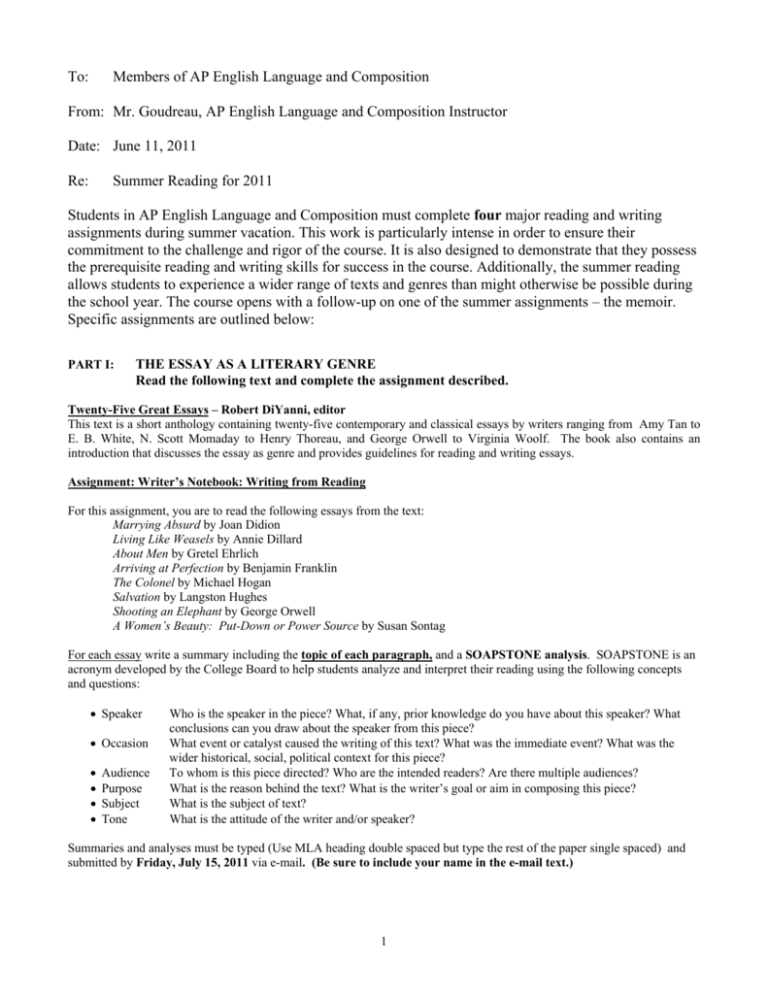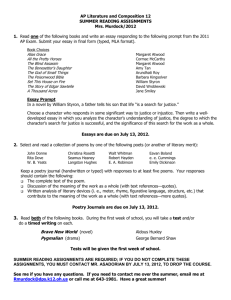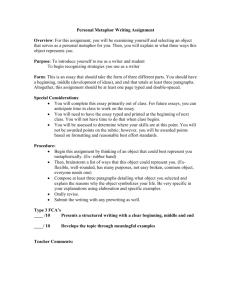To: Members of AP English Language and Composition From: Mr
advertisement

To: Members of AP English Language and Composition From: Mr. Goudreau, AP English Language and Composition Instructor Date: June 11, 2011 Re: Summer Reading for 2011 Students in AP English Language and Composition must complete four major reading and writing assignments during summer vacation. This work is particularly intense in order to ensure their commitment to the challenge and rigor of the course. It is also designed to demonstrate that they possess the prerequisite reading and writing skills for success in the course. Additionally, the summer reading allows students to experience a wider range of texts and genres than might otherwise be possible during the school year. The course opens with a follow-up on one of the summer assignments – the memoir. Specific assignments are outlined below: PART I: THE ESSAY AS A LITERARY GENRE Read the following text and complete the assignment described. Twenty-Five Great Essays – Robert DiYanni, editor This text is a short anthology containing twenty-five contemporary and classical essays by writers ranging from Amy Tan to E. B. White, N. Scott Momaday to Henry Thoreau, and George Orwell to Virginia Woolf. The book also contains an introduction that discusses the essay as genre and provides guidelines for reading and writing essays. Assignment: Writer’s Notebook: Writing from Reading For this assignment, you are to read the following essays from the text: Marrying Absurd by Joan Didion Living Like Weasels by Annie Dillard About Men by Gretel Ehrlich Arriving at Perfection by Benjamin Franklin The Colonel by Michael Hogan Salvation by Langston Hughes Shooting an Elephant by George Orwell A Women’s Beauty: Put-Down or Power Source by Susan Sontag For each essay write a summary including the topic of each paragraph, and a SOAPSTONE analysis. SOAPSTONE is an acronym developed by the College Board to help students analyze and interpret their reading using the following concepts and questions: Speaker Occasion Audience Purpose Subject Tone Who is the speaker in the piece? What, if any, prior knowledge do you have about this speaker? What conclusions can you draw about the speaker from this piece? What event or catalyst caused the writing of this text? What was the immediate event? What was the wider historical, social, political context for this piece? To whom is this piece directed? Who are the intended readers? Are there multiple audiences? What is the reason behind the text? What is the writer’s goal or aim in composing this piece? What is the subject of text? What is the attitude of the writer and/or speaker? Summaries and analyses must be typed (Use MLA heading double spaced but type the rest of the paper single spaced) and submitted by Friday, July 15, 2011 via e-mail. (Be sure to include your name in the e-mail text.) 1 PART II: AMERICAN BIOGRAPHY Read the following biography. Then complete the assignment described. No Ordinary Time – Doris Kearns Goodwin No Ordinary Time describes how the isolationist and divided United States of 1940 was unified under the extra-ordinary leadership of Franklin Roosevelt to become the preeminent economic and military power in the world. Using diaries, interviews, and White House records of the president's and first lady's comings and goings, Goodwin paints an intimate portrait of the daily conduct of the presidency during wartime, and the Roosevelts' extraordinary constellation of friends, advisers, and family. Bringing to bear the tools of both history and biography, No Ordinary Time relates the unique story of how Franklin Roosevelt led the nation to victory against seemingly insurmountable odds and, with Eleanor's essential help, forever changed the fabric of American society. Assignment: Critical Analysis Paper As you read the text, take notes including page numbers of examples or quotes about important aspects of the character of Franklin Delanor Roosevelt as well as his wife Eleanor. These notes must be typed and handed in with your paper. Write a 5-7 page critical essay in which you analyze Roosevelt as a man and a president including the relationship with his wife. Use quotations from the text (taken from your notes) as evidence to support your ideas. Your essay should be typed using MLA format. This essay must be submitted by Friday, August 12, 2011 via e-mail. (Be sure to include your name in the e-mail text.) PART III: REALISTIC FICTION ABOUT THE VIETNAM WAR Read the following novel. Then complete the assignment below: The Things They Carried – Tim O’Brien "Vietnam was full of strange stories, some improbable, some well beyond that, but the stories that will last forever are those that swirl back and forth across the border between trivial and bedlam." First published in 1979, Tim O'Brien's The Things They Carried is an unparalleled Vietnam testament, a classic study of men at war that brilliantly -- and painfully --illuminates the capacity, and the limits, of the human heart and soul. Focusing on the members of a single platoon (one of whom happens to be a 21-year-old grunt named Tim O'Brien) the 22 interconnected stories of this collection catalogue not only the things they carried into battle -- M-16s, grenade launchers, candy, Kool-Aid, and cigarettes -- but more importantly, the things they carried inside, and the nightmares they carried home (www.bn.com). Assignment: Literary Reaction Journal Create a journal in the voice of a character who is part of the group of men. Include what events happened to the characters (plot) and how the characters reacted to those events. Also include the characters’ inner thoughts (character) about war and adapting to difficult situations that they faced (theme). Include your own thoughts as if you are witnessing what the characters witness. Be creative with the presentation of the journal even though it is created on the computer. Add pictures that show the main ideas or feelings of the characters, but do not have more pictures than writing. Journal/Diary should have a minimum of twenty entries. This assignment must be submitted by Friday, August 26, 2011 via e-mail. (Be sure to include your name in the e-mail text.) . PART IV: CONTEMPORARY AMERICAN MEMOIRS Read one of the following memoirs. Then complete the assignment described. Silent Dancing: A Partial Remembrance of a Puerto Rican Childhood – Judith Ortiz Cofer “Judith Ortiz Cofer’s talent for story telling was learned at the knee of her grandmother, “Mama.” In this entertaining and perceptive book, the author’s life unfolds through tales set in Mama’s room, in Puerto Rican pueblos, and in Paterson, New Jersey apartments. Her father joins the U.S. Navy, and when his ship is in port in New York City, the family lives in New Jersey; when he is at sea, they move back to Puerto Rico to a life with family and many friends. After Judith starts school, the family spends summers in Puerto Rico and the school year in New Jersey. Life there is very restricted: her father leaves instructions not to mingle with neighbors; he has plans for a better life for his family, certainly one better than the nearpoverty conditions of this neighborhood. Judith Cofer’s mother takes her husband’s words to heart and rarely interacts with her New Jersey acquaintances, leaving Judith to become her mother’s voice in dealing with neighbors and shopkeepers while her father is away. Her father, a strong person, takes on much of Judith’s responsibility when he is home. This relieves her but also creates confusion about her role in the family. Growing up in two cultures, Judith both identifies with and feels 2 rejected by each. This memoir, comprising essays that can stand alone, also includes some of the author’s poems, which further illuminate her experiences and add to our understanding of this child of two worlds” (www.amazon.com, quoting Holly Smith in 500 Great Books by Women). Black Boy (Part I: Southern Night) – Richard Wright “Black Boy is a classic of American autobiography, a subtly crafted narrative of Richard Wright’s journey from innocence to experience in the Jim Crow South. An enduring story of one young man’s coming off age during a particular time and place, Black Boy remains a seminal text in our history about what it means to be a man, black, and Southern in America” [Note: You are not required to read “Part II: The Horror and the Glory.”] (www.bn.com). Hunger of Memory: The Education of Richard Rodriguez – Richard Rodriguez “Hunger of Memory is the story of Mexican-American Richard Rodriguez, who begins his schooling in Sacramento, California, knowing just 50 words of English, and concludes his university studies in the stately quiet of the reading room of the British Museum. Here is the poignant journey of a ‘minority student’ who pays the cost of his social assimilation and academic success with a painful alienation — from his past, his parents, his culture — and so describes the high price of ‘making it’ in middle-class America. Provocative in its positions on affirmative action and bilingual education, Hunger of Memory is a powerful political statement, a profound study of the importance of language ... and the moving, intimate portrait of a boy struggling to become a man (www.amazon.com/). Assignment: Reading Response Journal As you read the text, keep a journal filled with responses to your reading. (Journals must be typed.) Do not just summarize the contents of the book. Analyze, interpret, and evaluate the memoir. Discuss its major themes and the deeper implications of the writer’s experiences. Analyze and describe the writer’s style and the rhetorical techniques that create that style (e.g., diction, syntax, figurative language, imagery, point of view, tone). Grapple with the ideas that grow out of your reading. Draw connections to your own experiences, other texts, and/or the wider world. Be sure to identify and write about specific passages/quotations that capture important ideas you encounter in the work. Your journal must contain a minimum of ten (10) entries of at least 100 words each and must cover the entire scope of the work, not just one section. On Tuesday, September 6, 2011, you will be asked to write an essay in class based upon this book. Your journal entries will be your prewriting and reference material. You will be allowed to use the journal during the assessment. Journals will be collected after the essay and will be a part of the grade. IMPORTANT INFORMATION: 1. Follow the MLA enclosed guidelines for each paper. All students must word process their papers, using Microsoft Word if possible, and save your files on both your home computer and a portable storage device (e.g. memory stick, disk, CD). 2. All work for these assignments must be original. You are not expected, nor are you encouraged, to consult reference materials The instructor wishes to evaluate your ability to read, interpret, analyze, and write about the literature. He does not wish to evaluate the work of a professional literary critic or study aids such as gradesaver.com or sparknotes.com. 3. The entire summer reading project will constitute two test grades on the first quarter. Late assignments will not be accepted without contact before the due date. Failure to hand in assignments on time will result in dismissal from the AP Language and Composition class. Assignments will be evaluated based on reading and writing skills displayed, quality of content, time and effort invested, neatness and ability to follow directions. 4. Questions and submissions of work should be sent to goudreaur@bsd-ri.net. Your assignments will not be printed out and you will receive only a rubric sheet with your grade. I will respond to your submission with a received notice. If you do not receive a notice, please check the address and resend your work. 3 BURRILLVILLE HIGH SCHOOL SUMMER READING 2011 ACKNOWLEDGEMENT OF RECEIPT OF SUMMER READING ASSIGNMENT Date ________________________________ I _______________________________________ acknowledge that I have received my summer (student’s name printed) reading assignment for AP English Language and Composition. I realize that failure to complete any part of this assignment will result in dismissal from the AP Language and Composition class. I am also aware that copies of the summer reading assignments for all grades and courses will be available in the guidance office and on the high school web site during the summer. If my English course changes, I realize it is my responsibility to obtain the correct assignment from one of these sources. _______________________________________ (student’s signature) 4
![Submission 68 [doc]](http://s3.studylib.net/store/data/008000926_1-fed8eecce2c352250fd5345b7293db49-300x300.png)







